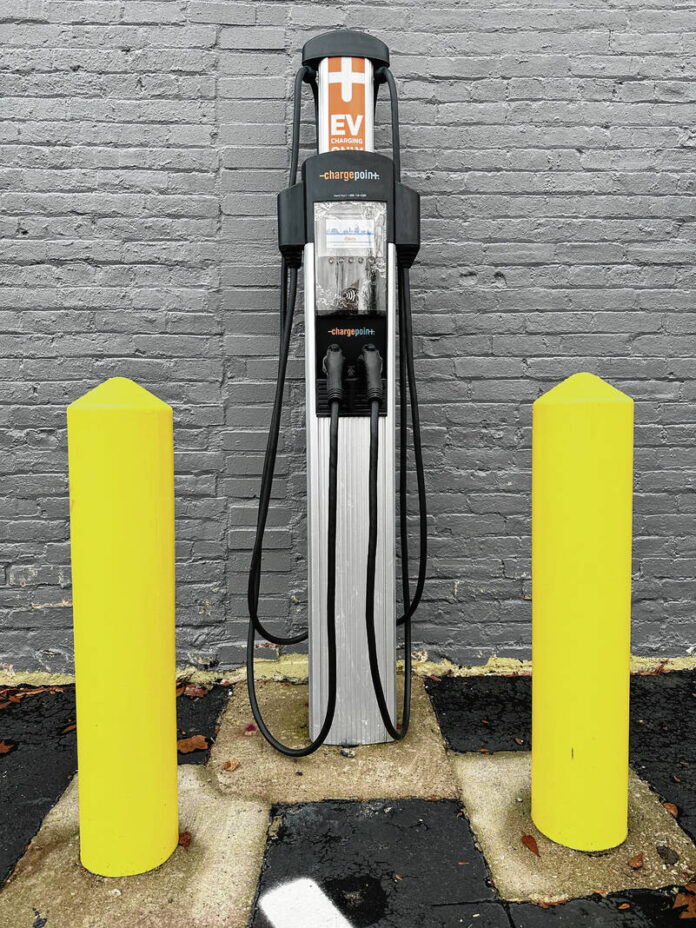GREENFIELD – Considerations for electric vehicle charging stations in the city just got a $75,000 boost.
The Indianapolis Metropolitan Planning Organization awarded Greenfield the grant to study and plan for charging stations faster and more powerful than the ones the city currently has.
Jason Koch, Greenfield city engineer, said electric vehicles and the infrastructure for them go a long way toward energy independence. He also pointed to the large amounts of money state and federal governments are investing in that objective.
The Indiana Department of Transportation announced in September that the Federal Highway Administration approved the state’s plan to use funding from the National Electric Vehicle Infrastructure program to build out a statewide electric vehicle charging network. The plan approval clears the way for the state to work with private and public partners to begin investing nearly $100 million over the next five years to bolster the availability of fast, reliable EV charging infrastructure across the state.
“This planning grant will help Greenfield get their foot in the door, have a lead on other communities around the state,” Koch said.
There are three levels of electric vehicle charging stations. Level 1 provides about 5 miles of range per one hour of charging. Level 2 provides about 25 miles of range per one hour of charging. The city has Level 2 charging stations at City Hall, near Lincoln Square Pancake House and at Greenfield Power & Light. Level 3, or DC fast charging stations, provide about 100 to 200 or more miles of range per 30 minutes of charging.
The study Greenfield’s grant will fund will focus on Level 3 charging stations, which the city currently lacks. Koch said officials are eyeing the area near Interstate 70’s interchange with Ind. 9 for such stations.
“So folks traveling across the country will have a network of these things so that we can reduce the whole (distance) range anxiety that folks have with electric vehicles,” Koch said.
The study will also help the city identify stakeholders that may want to engage in public-private partnerships.
“Because a lot of times these fast-charging stations can be co-located with businesses where those businesses might want you to linger for a half-hour,” Koch said.
The result is a mutually beneficial situation in which a driver gets to charge their vehicle while a business gains a customer.
“It’s going to be kind of a different way of thinking about how we go about electric vehicles,” Koch said. “It’s not going to be quite as quick as pumping out a tank of gas, but there are ways to make things efficient – planning your trips to go out to eat and get your fast charge.
“There’s opportunity here for a new way of thinking,” he continued, “and we want to get in on the ground floor so we can figure out with Power & Light, and [the Indiana Municipal Power Agency], and our private partners here on if this makes sense, and if this makes sense financially, if this makes sense from a market perspective, what’s the long-term maintenance going to cost, what’s the initial cost going to be.”
Koch said the city will issue a request for proposals for the planning study and anticipates hiring a firm to carry out the study this year. He estimates the study itself will take nine to 12 months.
“From there we’ll have a road map so that when the federal dollars for construction come out, we’ll have a real good idea on how this is going to work, where it’s going to work, who our partners might be; all the whos, whats, whens, wheres, whys we’ll need to plug into this thing.”
The process will involve seeking public feedback as well.
“We do think it’s the future, but we’ve got to plan for it,” Koch said. “Make sure the grid’s ready for it, have good locations to place these things with appropriate power, because these Level 3 chargers take massive amounts of energy to make them work.”





